“Love is the only answer to the thirst for happiness in each of us”
Ulaanbaatar, Mongolia: homily and final greeting of the Pope
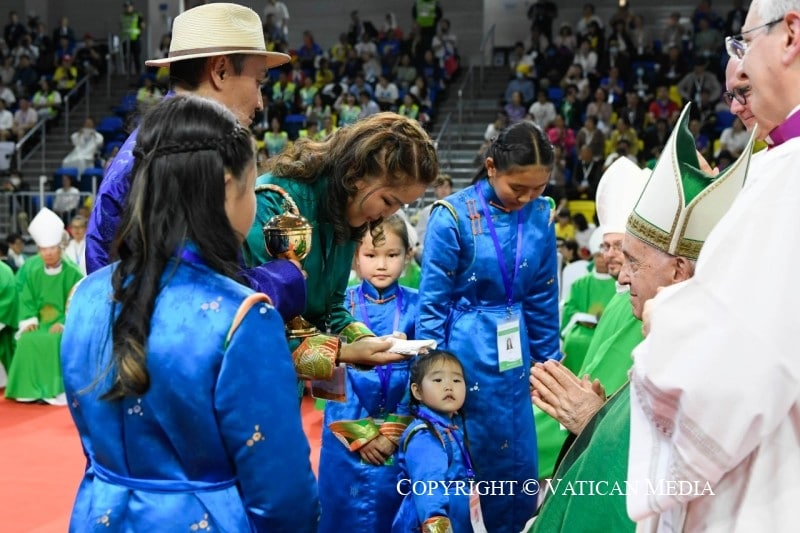
This afternoon, after leaving the Apostolic Prefecture, the Holy Father Francis moved by car to the Steppe Arena for Holy Mass.
Upon arrival, after changing cars, the Pope made a few rounds in the golf car among the more than 2000 faithful present and at 4:00 p.m. (10:00 a.m. Rome’s time) presided over the Eucharistic Celebration in English, on the XXII Sunday of Ordinary Time.
During the Holy Mass, after the proclamation of the Gospel, the Holy Father delivered the homily.
At the end, after an address of homage by the Apostolic Prefect of Ulaanbaatar, His Eminence Card. Giorgio Marengo, I.M.C., and before the final blessing, the Pope addressed a final greeting and some words of thanks to the faithful and pilgrims present. He then returned by car to the Apostolic Prefecture, where he had a private dinner.
We publish below the homily and the final greeting that the Holy Father gave during the Holy Mass:
Homily of the Holy Father
With the words of the Responsorial Psalm, we prayed: “O God… my soul thirsts for you; my flesh faints for you, as in a dry and weary land where there is no water” (Ps 63:2). This magnificent plea accompanies our journey through life, amid all the deserts we are called to traverse. It is precisely in those deserts that we hear the good news that we are not alone in our journey; those times of dryness cannot render our lives barren forever; our cry of thirst does not go unheard. God the Father has sent his Son to give us the living water of the Holy Spirit to satisfy our souls (cf. Jn 4:10). Jesus, as we heard in the Gospel, shows us the way to quench our thirst. It is the way of love, which he followed even to the cross, and on which he calls us to follow him, losing our lives in order to find them (cf. Mt 16:24-25).
Let us reflect together on these two things: the thirst within us, and the love that quenches that thirst.
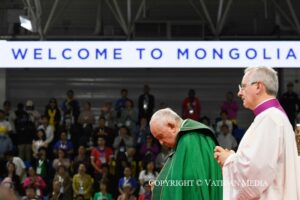 First, we are called to acknowledge the thirst within us. The Psalmist cries out to God in his aridity, for his life has become like a desert. His words have a particular resonance in a land like Mongolia: immense, rich in history and culture, yet a land also marked by the aridity of the steppes and the desert. Many of you know both the satisfaction and the fatigue of journeying, which evokes a fundamental aspect of biblical spirituality represented by Abraham and, in a broader sense, by the people of Israel and indeed every disciple of the Lord. For all of us are “God’s nomads”, pilgrims in search of happiness, wayfarers thirsting for love. The desert of which the Psalmist speaks, then, is our life. We are that dry land thirsting for fresh water, water that can slake our deepest thirst. Our hearts long to discover the secret of true joy, a joy that even in the midst of existential aridity, can accompany and sustain us. Deep within us, we have an insatiable thirst for happiness; we seek meaning and direction in our lives, a reason for all that we do each day. More than anything, we thirst for love, for only love can truly satisfy us, bring us fulfilment; only love can make us happy, inspire inner assurance and allow us to savour the beauty of life. Dear brothers and sisters, the Christian faith is the answer to this thirst; it takes it seriously, without dismissing it or trying to replace it with tranquilizers or surrogates. For in this thirst lies the great mystery of our humanity: it opens our hearts to the living God, the God of love, who comes to meet us and to make us his children, brothers and sisters to one another.
First, we are called to acknowledge the thirst within us. The Psalmist cries out to God in his aridity, for his life has become like a desert. His words have a particular resonance in a land like Mongolia: immense, rich in history and culture, yet a land also marked by the aridity of the steppes and the desert. Many of you know both the satisfaction and the fatigue of journeying, which evokes a fundamental aspect of biblical spirituality represented by Abraham and, in a broader sense, by the people of Israel and indeed every disciple of the Lord. For all of us are “God’s nomads”, pilgrims in search of happiness, wayfarers thirsting for love. The desert of which the Psalmist speaks, then, is our life. We are that dry land thirsting for fresh water, water that can slake our deepest thirst. Our hearts long to discover the secret of true joy, a joy that even in the midst of existential aridity, can accompany and sustain us. Deep within us, we have an insatiable thirst for happiness; we seek meaning and direction in our lives, a reason for all that we do each day. More than anything, we thirst for love, for only love can truly satisfy us, bring us fulfilment; only love can make us happy, inspire inner assurance and allow us to savour the beauty of life. Dear brothers and sisters, the Christian faith is the answer to this thirst; it takes it seriously, without dismissing it or trying to replace it with tranquilizers or surrogates. For in this thirst lies the great mystery of our humanity: it opens our hearts to the living God, the God of love, who comes to meet us and to make us his children, brothers and sisters to one another.
This brings us to the second thing: the love that quenches our thirst. First was our deep, existential thirst, and now we reflect on the love that quenches our thirst. This is the heart of the Christian faith: God, who is Love, has drawn near to you, to me, to everyone, in his Son Jesus, and wants to share in your life, your work, your dreams and your thirst for happiness. It is true that, at times, we feel like a “dry and weary land where there is no water”, yet it is equally true that God cares for us and offers us clear, refreshing water, the living water of the Spirit, springing up within us to renew us and free us from the risk of drought. Jesus gives us that water. As Saint Augustine tells us, “…if we recognize ourselves in those who thirst, we can also recognize ourselves in those who quench that thirst” (On the Psalms, 63:1). Indeed, if in this life we often experience the desert with loneliness, fatigue and emptiness, we should also remember, with Augustine, that, “lest we grow faint in this desert, God refreshes us with the dew of his word… True, he makes us feel thirst, but then comes to satisfy that thirst… God has been merciful to us; he has opened for us a highway in the desert:our Lord Jesus Christ”. And that is the path through the desert of our lives. “He has offered us a source of consolation in that desert: the preachers of his word. He has offered us water in that desert, by filling those preachers with the Holy Spirit, so as to create, in them, a fount of water springing up to life everlasting” (ibid., 1, 6). These words, dear friends, speak to you of your own history. Amid the deserts of life and in the difficulties associated with being a small community, the Lord has ensured that you not lack the water of his word, thanks especially to the preachers and missionaries who, anointed by the Holy Spirit, sow among you the seeds of its beauty. That word always brings us back to what is essential, to the very heart of our faith: allowing ourselves to be loved by God and in turn to make our lives an offering of love. For love alone truly quenches our thirst. Let us never forget: love alone truly quenches our thirst.
That is precisely what Jesus tells the apostle Peter in today’s Gospel. Peter cannot accept the fact that Jesus must suffer, be charged by the leaders of the people, undergo his passion and then die on the cross. Peter reacts, he protests, he tries to convince Jesus that he is wrong, because, in Peter’s mind – and we too often have the same idea – the Messiah cannot possibly end in failure, dying on a cross like a criminal forsaken by God. The Lord then rebukes Peter because he thinks “as the world does”, and not as God does (cf. Mt 16:21-23). If we think that success, power, or material things suffice to satisfy the thirst in our lives, then we are thinking as the world does. That kind of worldliness leads nowhere; indeed, it leaves us thirstier than before. Jesus instead shows us the way: “If any want to become my followers, let them deny themselves and take up their cross and follow me. For those who want to save their life will lose it, and those who lose their life for my sake will find it” (Mt 16:24-25).
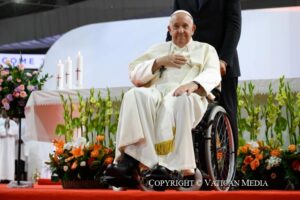 This, dear brothers and sisters, is surely the best way: to embrace the cross of Christ. At the heart of Christianity is an amazing and extraordinary message. If you lose your life, if you make it a generous offering in service, if you risk it by choosing to love, if you make it a free gift for others, then it will return to you in abundance, and you will be overwhelmed by endless joy, peace of heart, and inner strength and support; and we need inner peace.
This, dear brothers and sisters, is surely the best way: to embrace the cross of Christ. At the heart of Christianity is an amazing and extraordinary message. If you lose your life, if you make it a generous offering in service, if you risk it by choosing to love, if you make it a free gift for others, then it will return to you in abundance, and you will be overwhelmed by endless joy, peace of heart, and inner strength and support; and we need inner peace.
This is the truth that Jesus wants us to discover, the truth he wants to reveal to all of you and to this land of Mongolia. You need not be famous, rich or powerful to be happy. No! Only love satisfies our hearts’ thirst, only love heals our wounds, only love brings us true joy. This is the way that Jesus taught us; this is the path that he opened up before us.
May we too, dear brothers and sisters, heed what the Lord said to Peter in response: “Get behind me” (Mt 16:23). In other words, be my disciple, walk in my footsteps and stop thinking as the world does. If we do this, we will be able, with the grace of Christ and the Holy Spirit, to journey along the path of love. Even when love calls for denying ourselves, combatting our personal and worldly forms of selfishness, and taking the risk of living a life of genuine fraternity. For while it is true that all these things entail effort and sacrifice, and sometimes taking up the cross, it is even more true that, when we lose our lives for the sake of the Gospel, the Lord gives them back to us abundantly, in the fullness of love and joy for all eternity.
______________________________________________________
Remarks of His Holiness Pope Francis at the Conclusion of Holy Mass
I would like to take this opportunity, in the presence of these two brother bishops – the Emeritus of Hong Kong and the current Bishop of Hong Kong – to send a heartfelt greeting to the noble Chinese people. I send my good wishes to them all: always move forward, always advance! And to Chinese Catholics: I ask you to be good Christians and good citizens. To all of you, thank you.
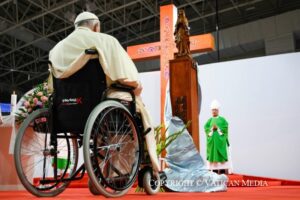 Thank you, Your Eminence, for your kind words, and thank you for your gift! You mentioned that in these days you could feel how dear the people of God in Mongolia are to my heart. That is true: I embarked on this pilgrimage with great anticipation, with the desire to meet all of you and to get to know you. Now I thank God for you, since, through you, he loves to use what is little to achieve great things. Thank you, because you are good Christians and honest citizens. Go forward, gently and without fear, conscious of the closeness and the encouragement of the entire Church, and above all the tender gaze of the Lord, who forgets no one and looks with love upon each of his children.
Thank you, Your Eminence, for your kind words, and thank you for your gift! You mentioned that in these days you could feel how dear the people of God in Mongolia are to my heart. That is true: I embarked on this pilgrimage with great anticipation, with the desire to meet all of you and to get to know you. Now I thank God for you, since, through you, he loves to use what is little to achieve great things. Thank you, because you are good Christians and honest citizens. Go forward, gently and without fear, conscious of the closeness and the encouragement of the entire Church, and above all the tender gaze of the Lord, who forgets no one and looks with love upon each of his children.
I greet my brother bishops, the priests, the consecrated men and women, and all the friends who have come here from different countries, particularly from various regions of the immense continent of Asia, in which I am honoured to find myself. I embrace all of you with great affection. I am especially grateful to all those who assisted the local Church with their spiritual and material support.
In these days, important Government delegations have been present at every event. I thank the President and the Authorities for their welcome and hospitality, and for all of the preparations that were made. I felt at first hand your traditional friendliness; thank you!
I also offer a warm greeting to our brothers and sisters of other Christian confessions and other religions. May we continue to grow closer in fraternity, as seeds of peace in a world tragically devastated by all too many wars and conflicts.
My heartfelt thanks likewise go to all those who have worked, so hard and for such a long time, to make my Journey possible and successful, and to all those who prepared for it by their prayers.
Your Eminence, you reminded us that in the Mongolian language the word for “Thank you” comes from the verb “to rejoice”. My own “Thank you” dovetails perfectly with this marvellous insight of the local language, for it is full of joy. It is a great “Thank you” to the Mongolian people, for the gift of friendship that I received in these days, for your genuine capacity to value even the most simple aspects of life, to wisely preserve relationships and traditions, and to cultivate daily life with care and attention.
The Mass is itself a way of giving thanks: “Eucharistía”. To celebrate Mass in this land brought to my mind the prayer that the Jesuit Father Pierre Teilhard de Chardin offered to God exactly a hundred years ago, in the desert of Ordos, not far from here. He prayed: “My God, I prostrate myself before your presence in the universe that has now become living flame: beneath the lineaments of all that I shall encounter this day, all that happens to me, all that I achieve, it is you I desire, you I await”. Father Teilhard de Chardin was engaged in geological research. He fervently desired to celebrate Holy Mass, but lacked bread and wine. So he composed his “Mass on the World”, expressing his oblation in these words: “Receive, O Lord, this all-embracing host, which your whole creation, moved by your magnetism, offers you at the dawn of this new day”. A similar prayer had already taken shape in him when he served as a stretcher-bearer on the front lines during the First World War. This priest, often misunderstood, had intuited that “the Eucharist is always in some way celebrated on the altar of the world” and is “the living centre of the universe, the overflowing core of love and of inexhaustible life” (Laudato Sì, 236), even in times like our own, marked by conflicts and wars. Let us pray this day, then, in the words of Father Teilhard de Chardin: “Radiant Word, blazing Power, you who mould the manifold so as to breathe life into it, I pray you, lay on us those your hands – powerful, considerate, omnipresent”.
Dear brothers and sisters of Mongolia, thank you for your witness. Bayarlalaa! [Thank you!]. May God bless you. You are in my heart, and in my heart you will remain. Remember me, please, in your prayers and in your thoughts. Thank you.
Related
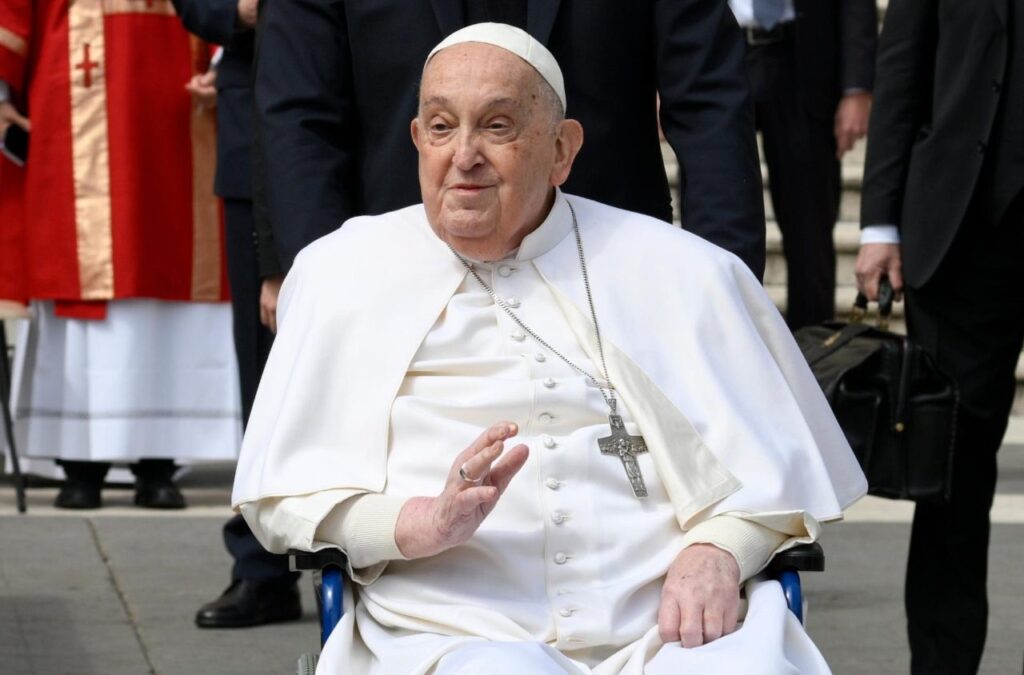
Pope Francis in active recovery: preparing the meditations for the Stations of the Cross while delegating the liturgies of the Triduum
Exaudi Staff
16 April, 2025
2 min

Francis Promotes Spiritual and Pastoral Renewal in Vatican Diplomacy
Exaudi Staff
16 April, 2025
8 min
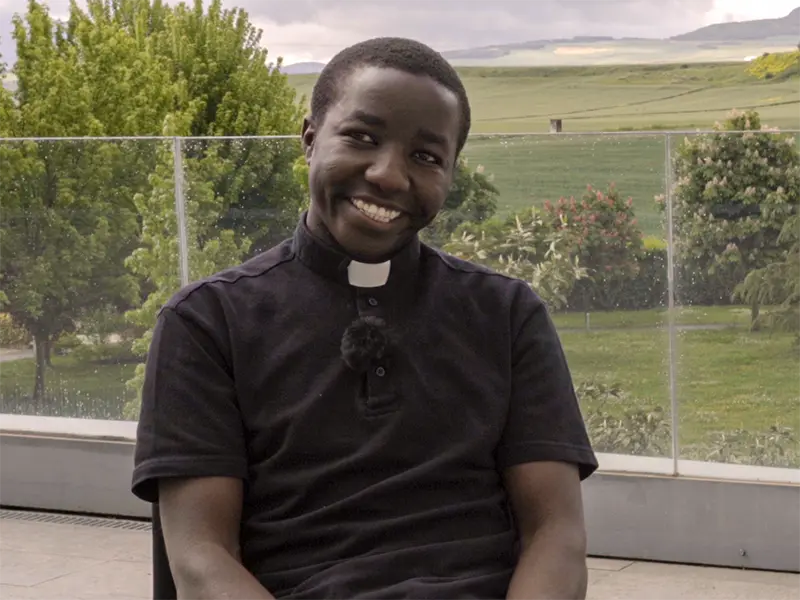
“Being Catholic in Tanzania is a source of pride”
Fundación CARF
16 April, 2025
6 min

The Vatican Suppresses the Sodalitium of Christian Life After a Long Discernment Process
Exaudi Staff
15 April, 2025
1 min
 (EN)
(EN)
 (ES)
(ES)
 (IT)
(IT)

